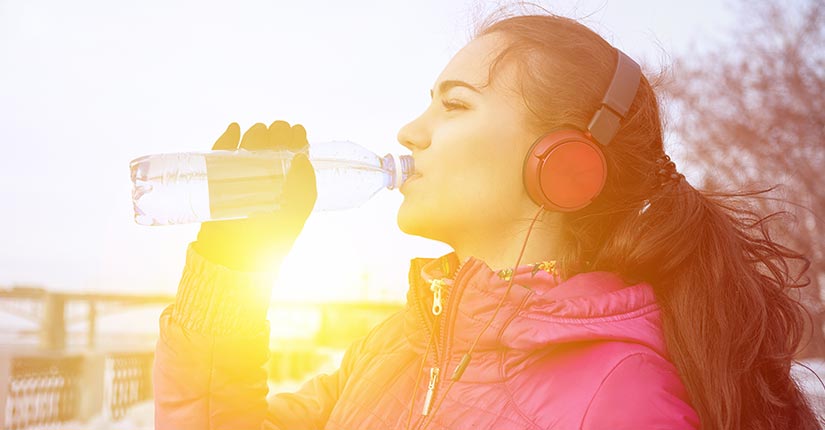It is time to say goodbye to the scorching summer heat and the long sweaty days because winter in coming! Time to curl up next to the fireplace, wear warm and snuggly clothes and drinks lots and lots of coffee and tea.
While this picturesque concept of winters is tempting, it is not perfect. Coldwinters might call for the warm, soothing caffeinated beverage, making you forget all about water. Unlike hot summers where thirst serves as a constant reminder for rehydration, many people run the danger of dehydration during the cold weather.
The dangers of lack of adequate water intake
Water is an important component of almost all the reactions in the body. It supports many of the crucial processes in the body like temperature regulation, maintenance of blood volume, lubrication of the joints, absorption of important minerals etc.
If there is dearth of water in the body, important functions collapse. Dehydration leads to fatigue, digestive issues, bad skin, concentrated urine. Moreover, many organs of the body suffer as well, especially kidneys as the toxins are not properly leeched out of the body. Concentration of the minerals in them also leads to problems like kidney stones, urinary tract infections that will have you running for the top urologist in Lahore.
Moreover, as the body is unable to properly flush out the toxins, it is more susceptible to illnesses as well.
How do winters lead to dehydration?
There are many reasons for dehydration; very commonly, it is the digestive issues like vomiting and diarrhea that lead to extreme water loss. If not treated well within time, it can also lead to death as well.
However, that’s not always why your body gets dehydrated. In winters, we don’t feel parched and hence water intake goes to the back of our minds. Also, people tend to drink more caffeinated beverages, which also encourage water loss from the body.
Similarly, due to the energy spent by the body in attempts to keep warm and the heavy clothing that promotes sweating, a great deal of gets lost from the body.
How do tell if you are dehydrated?
The most obvious sign of dehydration is the lack of frequent urination. Also, the urine color is also dark when it is concentrated, as is the case when we drink less water. Moreover, fatigue and disorientation are also amongst the indicators of dehydration.
Tips to rehydrate!
Men need more water than women do; they need around 125 ounces of water daily whereas women need around 91 ounces. That’s around 3 liters of water on average for both and the following tips will help you achieve this target during winters!
Keep a daily water intake log
It is important to initially keep track of your water intake so you can meet your daily targets. The easiest way is to keep a water bottle handy. The number of times you get it refilled will help you remember how much water you have had for the day. Water bottle also is convenient to carry so that you can hydrate any and everywhere.
Similarly, many applications are also available that help you keep track of your diet and water in take. You can also simply your water tally into the app. Once the habit forms, it will become a reflex and you will be at the top of your stay-hydrated game.
Count the caffeine
Caffeine promotes water loss from the body and therefore its excessive intake will lead to dehydration as well. If you cannot live without you cuppa coffee, drink more water to cover up the water loss. Or else, go for decaf versions after a couple of cups.
Eat natural foods with high water content
You do not to just drink water; you can also get sufficient hydration from fruits and vegetables as well. Oranges, celery, broccoli, peaches, cucumbers, strawberries are some of the foods that are rich in water. Consume greater quantities of these fresh foods as well.
Post workout hydration
In summers, when we workout, our clothes get drenched from the sweat and make us realize that we need to drink up. However, in winters, the thick layers of clothes absorb the sweat so many people do not get a proper idea of how much water they just lost via sweat.
So, if you work out, drink water. Do not rely on your sweat patches to give you an estimate of water loss; just trust that you did!
Warm Teas
Everyone likes hot beverages in winters that soothe the throat and leave the trace of warmth in the aftermath. So, if you don’t want to drink the cold water, instead, make yourself warm herbal teas.
They not only have amazing benefits for health, but as are composed entirely of water, are also hydration boosters as well. For people whose urinary health is already suffering due to dehydration, some teas like Sambong, hydrangea teas are known to be beneficial, but consult the best urologist in Lahore for best treatment first.
